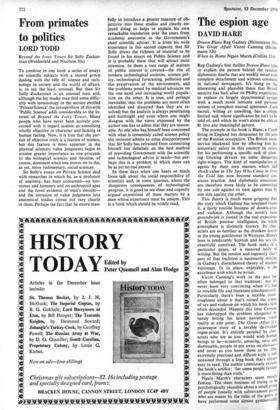From primates to politics
LORD TODD
Beyond the Ivory Tower Sir Solly Zucker. man (Weidenfeld and Nicolson 50s) To combine in one book a series of essays on scientific subjects with a second group dealing with the role of science and tech- nology in society and the world of affairs, is, to say the least, unusual. But then Sir Solly Zuckerman is an unusual man and, although the lay reader may find some diffic- ulty with terminology in the section entitled `PrivateScience',the juxtaposition of thiswith `Public Science' adds considerably to the in- terest of Beyond the Ivory Tower. Many people who have never been actively con- cerned with it regard science as something wholly objective in character and lacking in human feeling. Now, it is true that the pur- suit of objective truth is a feature of science, but this feature is most apparent in the physical sciences; value judgments begin to assume greater importance as one proceeds to the biological sciences and become, of course, dominant when one moves on to the, as yet, more rudimentary, social sciences.
Sir Solly's essays on Private Science deal with researches in which he, as a professor of anatomy, has been concerned—on hor- mones and humours and on anthropoid apes and the fossil evidence of man's descent— and the intrusion of value judgments into anatomical studies comes out very clearly in them. Perhaps the fact that he strove man•
fully to introduce a greater measure of ob.. jectivity into these studies and clearly en• joyed doing so helps to explain his own remarkable translation over the years from academic anatomist to the Government's chief scientific adviser. It is from his wide experience in this second capacity that Sir Solly draws the richness of material to be found in his essays on Public Science and it is probably these that will attract most attention. In them a vast range of matters of public interest is covered—the rise of modern technological societies, science pol- icy, technological forecasting, pollution and the preservation of the environment, and the-problems posed by medical advances on the one hand and increasing world popula- tion on the other. It is true, and perhaps inevitable, that the problems are more often identified and dissected than they are re- solved; but the analysis is always penetrating and forthright and even where one might disagree with the views expressed by the author one has to admit that they are reason- able. As one who has himself been concerned with what is commonly called science policy the reviewer admits to some disappointment that Sir Solly has refrained from committing himself too definitely on the best method of providing Government with the scientific and technological advice it needs—but per- haps this is a problem to which there can be as yet no real answer.
In these days when one hears so much loose talk about the social responsibility of scientists and, in some quarters, about the dangerous consequences of technological progress, it is good to see clear and cogently argued expositions of these matters by a man whose experience must be unique. This is a book which should be widely read.










































 Previous page
Previous page